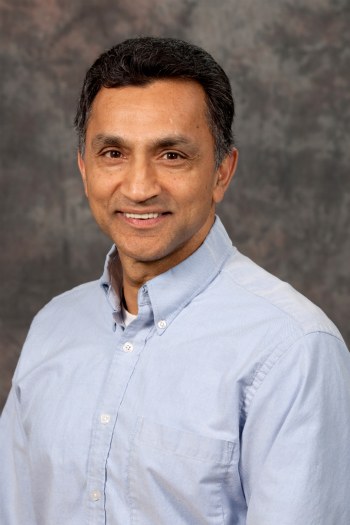
Dr. Brian Maraj loves to teach! His dedication to the art of creating an outstanding classroom experience for students has resulted in a SALUTE Award.
It's the PEDS 203 class; professor Brian Maraj is teaching students the concepts of skills acquisition and performance. He has some nervously giggling members of the 'studio audience' as he calls his class when he wants volunteers, lined up one behind the other with instructions to touch, as rapidly as possible, four different spots of the back of the person in front of them.
There's anticipation, laughter in the air as the students try their best, but it's slow at first. As Maraj reduces the number of places they can touch, the pace of movement increases - it's easier and easier to hit the spots. When the students get the idea, Maraj turns the fun into a way to relate what the students have experienced and seen to demystify the complex laws of motor behaviour.
It's all part of engaging students in a rich learning experience, and one that's earned Maraj a 2011 Students' Union SALUTE teaching excellence award, to be awarded on March 28 at the Myer Horowitz Theatre. It's a ceremony he'll miss because of travel commitments, but an award he treasures immensely - and especially so because it's student-initiated.
"What's most humbling is that it came from the students," says Maraj, who understands all too well how busy students are with their own lives, let alone making the time to nominate a teacher.
But the students have every reason to take the time. Last year, Maraj showed how far he'll go to show a student he cares: he organised an all-day squash 'Maraj-athon' and fundraiser in honour of student Terry Tenove who had suffered a catastrophic spinal accident during a skating drill. "I wanted to do something I love (squash), for someone we love," says Maraj simply. His act of kindness raised over $4000 all of which went to The Steadward Centre's activity programs for kids with disabilities, in Terry's name.
Does he have a teaching strategy? "No strategy; I just let it unfold," he says. "I do know that I love the things that I teach. I try as best as I can to demonstrate the concepts and mechanisms so that students understand them. If they can see and understand something, they'll find applications for it in a number of different ways - maybe even well after they've completed their degrees."
Maraj also masterminded a laboratory research experience called KURTs - Kinesiology Undergraduate Research Teams - bringing some of his class's brightest sparks into his perceptual motor behaviour lab to work on a current research project together, or take on a new one. Maraj was awarded a McCalla Professorship on 2007 because of this innovative idea that integrates teaching and research - a key criterion of the award.
As part of a KURT, students are supervised by Maraj or graduate students in the lab and he says it's a great learning experience for the students and for him. "Students learn data collection, equipment usage, ethics approval, and generally get a real taste for the research experience and a greater appreciation for what it takes to answer a particular research question.
"I learn a lot too!" he says. "Undergraduates are a great source of different perspectives, energy, enthusiasm and ideas that really make you think. Their capacity for contribution is sometimes underestimated. I have always been very impressed with the level of undergraduate students that we've had here and I am so pleased that I get the opportunity to work with them both in the lab and in the class."
The secret to his success as a teacher he says lies in caring deeply about the material he's teaching and teaching it with passion - and caring deeply about each student in the class. "I speak to one student like I'd speak to 100; I speak to 100 like I'd speak to one. I think that if someone in an audience feels as though you're speaking directly to them that's a great step towards facilitating their understanding of something."
Maraj says he's found great students in his class year after year, "This is my twelfth year at the U of A and I feel blessed that I've had the opportunity to work with such incredible students. I have never been disappointed."